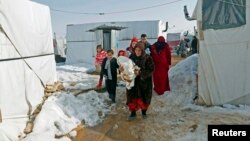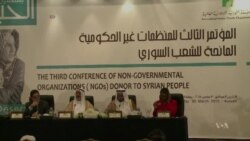Weighed down by a refugee crisis that shows no signs of abating, Lebanon's government aims to step out from the shadows of the United Nations and prove to potential big-money donors that it can take a role in saving not just Syrians, but Lebanon itself.
On Tuesday, donors from around the world will gather to help deal with the repercussions of the Syrian War, which has led to 12.2 million Syrians requiring humanitarian assistance and 3.4 million fleeing Syria.
Two previous donor conferences pledged a total of $3.9 billion.
Broader perspective
Hala al-Helou, advisor to Rashid Derbas, Lebanon’s minister of social affairs, claimed the dangers of the war within Lebanon’s borders were now so profound they threatened not just long-suffering Syrian refugees, but the country itself.
Al-Halou said the country has been flooded with an estimated 1.5 million refugees threatening Lebanon’s stability.
“We won’t be able to tend, not just to the Syrians, but to our own people, which is why we’re going there to ask for. not just humanitarian support, but support that will keep Lebanon standing on its feet today,” she said.
Bringing together 78 countries and 40 humanitarian agencies, the Kuwait conference offers some hope of gaining such support.
“It is extremely vital, and wouldn’t be taking place if it wasn’t necessary,” said UNHCR MENA spokeswoman Bathoul Ahmed. “Hopefully this will be as successful [as the first two conferences] in terms of getting the support needed. There is a lot of money being asked for but we are still hopeful.”
Taking the lead
The United Natios and its various agencies have led the way in Lebanon, handling the vast majority of funds being pledged to help with the crisis.
But following in the footsteps of neighboring countries Turkey and Jordan, the Lebanese government is trying to take a stronger lead in overseeing how donors’ money is spent.
The Lebanon Crisis Response Plan (LCRP) was launched in December to decide how the donors’ pledges will be spent during the next two years.
The LCRP’s goal is aimed at addressing not just refugees but the Lebanese communities affected by their presence. It also is taking a wider effort to battle poverty and instability in a country where a delicate sectarian balance is being put in jeopardy by the jihadists in the region.
Al-Halou said that getting the government involved was a good strategy.
“But what’s different today is that the government needs to take [a] leadership [role]. Doing that means we need to have control over what’s going on. For the past four years it’s been random people identifying the random needs of communities,” she said.
Oxfam’s Lebanon representative Fran Beytreyson said that narrowing the focus to how the Syrian crisis impacted Syria and Syrians did not convey the regional scope of the crisis.
“It translates into every sector and every walk of life in neighboring countries, and that kind of scope and scale is not easily understood,” she said.
Donor fatigue
Despite the large amount of money pledged at the previous two conferences, many said the international community was still not doing enough for Syria.
Some warned it could get worse as a result of donor fatigue. In 2013, 71 percent of the required funds to help those affected by the crisis were provided, a figure that dropped to 57 percent in 2014.
“We need to build the capacities of the institutions, NGOs and civil society,” said Helou. “These are the people who will continue to the support when the donors get tired, and the U.N. agencies don’t have the money any more - it will be the government that takes over this work.”
Efforts to expand the focus of aid to reach beyond the immediate need of Syrian refugees and address the destabilizing impact of the war as a whole through broader state-support are reflected in a wider trend among donors and those distributing the funds.
The U.N. relief plan for 2015/16 is seeking $8.4 billion to assist the nearly 18 million people affected by the conflict, including both Syrians and those affected in countries like Lebanon.
“We had to look at going beyond immediate assistance and address more ways of supporting the hosting countries” said UNHCR spokeswoman Ahmed.
Trust Issues
Although the Lebanese government’s efforts to take more control in distributing donations seems by some to be a good approach, convincing donors to place more trust in the government may not be an easy task.
The country recently ranked 136th out of 175 for Transparency International’s Corruption Perceptions Index.
Virginie Lefevre is a program and partnerships coordinator for the Amel Association, one of number of Lebanese NGOs being represented at the conference.
Lefevre told VOA that she had heard concerns regarding a shift of money and resources away from refugees and towards the state.
"It will take a lot of work to convince donors to work directly with the Lebanese government rather than through bodies like the United Nations," she sad. "But such concerns should not prevent the Lebanese government from taking an increasing lead in managing the crisis. It is up to those like the Amel Association to keep an eye on how the government handled funding."
Watch related video report from VOA's Zlatica Hoke:






